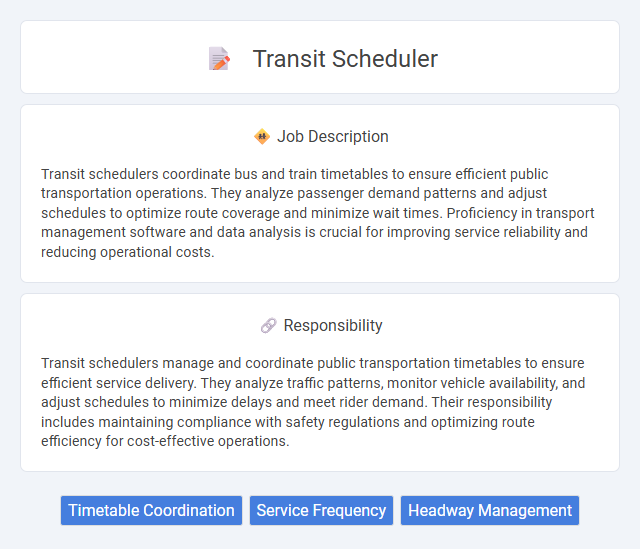
Transit schedulers coordinate bus and train timetables to ensure efficient public transportation operations. They analyze passenger demand patterns and adjust schedules to optimize route coverage and minimize wait times. Proficiency in transport management software and data analysis is crucial for improving service reliability and reducing operational costs.
Individuals with strong organizational skills and an ability to manage time efficiently are likely suitable for a transit scheduler position, as the role demands precise coordination of transit schedules. Those who thrive under pressure and can handle multiple tasks simultaneously may find this job fitting, while candidates who struggle with attention to detail or adapting to dynamic environments might face challenges. The probability of success increases if the person enjoys problem-solving and has good communication skills to interact with various transit personnel.
Qualification
A Transit Scheduler must have strong analytical skills, experience with route planning software, and knowledge of transportation regulations. Proficiency in data analysis and scheduling tools like GIS and CAD systems is essential for optimizing transit routes and timetables. A degree or diploma in transportation management, urban planning, or logistics significantly enhances job qualifications.
Responsibility
Transit schedulers manage and coordinate public transportation timetables to ensure efficient service delivery. They analyze traffic patterns, monitor vehicle availability, and adjust schedules to minimize delays and meet rider demand. Their responsibility includes maintaining compliance with safety regulations and optimizing route efficiency for cost-effective operations.
Benefit
A transit scheduler job likely offers benefits such as steady employment and opportunities for skill development in logistics and time management. Employees may have access to comprehensive health insurance and retirement plans depending on the organization. The role often provides a structured work environment that supports work-life balance through predictable hours.
Challenge
Transit scheduler roles likely involve complex challenges related to optimizing routes and timetables to meet fluctuating demand while minimizing delays. The position probably requires balancing resource constraints with passenger needs, which can result in difficult decision-making scenarios. Managing unexpected disruptions such as traffic or maintenance may frequently test problem-solving skills in real time.
Career Advancement
Transit schedulers play a critical role in optimizing transportation routes and timetables to ensure efficient public transit operations. Mastery of scheduling software and data analysis can lead to opportunities such as senior planning roles, transit operations management, and strategic development positions within transportation agencies. Continuous skill enhancement and gaining experience in logistics coordination significantly improve prospects for career advancement in the transit industry.
Key Terms
Timetable Coordination
Transit schedulers specializing in timetable coordination analyze route data and passenger flow to develop efficient, reliable transit schedules that maximize resource utilization and minimize wait times. They collaborate with operations teams to adjust time slots, ensuring alignment with peak demand periods and service frequency requirements. Expertise in software tools for schedule optimization and real-time data integration is essential to maintain punctuality and improve overall transit system performance.
Service Frequency
Transit schedulers optimize service frequency to balance rider demand and operational efficiency. They analyze ridership data, peak travel times, and route performance to determine optimal intervals between vehicles. Adjusting service frequency reduces wait times, prevents overcrowding, and improves overall transit system reliability.
Headway Management
Transit schedulers optimize headway management to maintain consistent intervals between buses or trains, reducing passenger wait times and preventing vehicle bunching. They analyze real-time data and traffic patterns to adjust schedules dynamically, ensuring efficient resource allocation and service reliability. Effective headway management enhances on-time performance and improves overall transit system capacity.
 kuljobs.com
kuljobs.com